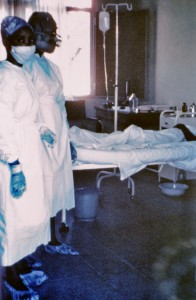Following recent media reports, the UN Mission for Ebola Emergency Response (UNMEER) seeks to clarify that Ebola is not an airborne disease. At this point in time we have no evidence and do not anticipate that the Ebola virus is mutating to become airborne.
However, there are real risks and concerns with this outbreak: every day more people are becoming infected and more are dying because they cannot get the care they need. Energy needs to be focused on swiftly addressing the real needs and gaps in communities affected by this disease.
The Ebola virus only spreads through contact with bodily fluids. The World Health Organization (WHO) monitors the virus closely. Viruses do mutate but it is a complex process that takes time. Right now, as advised by WHO, the safest thing anyone can do is avoid direct contact with bodily fluids of people who have Ebola, and with surfaces and materials (e.g. bedding, clothing) contaminated with fluids.









